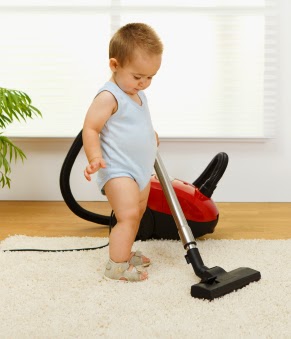Make Your Kids Part of the Cleaning Solution!
If
there is ever a time to get yourself, your home, and your family organized, it
is the back-to-school season! Organization and cleanliness is the key to
stress-free school days and we want you to start the school days off
right. The secret is to make your kids part of the solution, rather than the problem. So, we have collected some tips to help teach your kiddos the skills to make the back-to-school
transition as easy as ABC.

Ages 2-4: Keep It Simple and Start ‘Em Young
Ever notice how much fun your preschooler has "playing house" with a
broom and dustpan, or sorting different-colored Legos and blocks into buckets?
Scooping, stacking, wiping and matching are all developmental skills you can
further develop into a lifetime of good organizing and cleaning habits.
"Generally, toddlers enjoy being helpful and won't see cleaning as work
unless you make it sound like work," says Donna Smallin, author of Cleaning
Plain & Simple. "Keep an upbeat attitude, and make sure
you give little ones lots of praise."
Play the "Color Game." Name a
color and have them pick up and put away everything that is that color.
Make it a
game. Keep a clean plastic
dustpan handy to scoop up small toys from the floor, and set an egg timer for
five minutes. Your child will love seeing how many toys he or she can clean up
before the bell rings.
Make it fun. Give your kids a
couple of old, clean socks they can put on their hands and use to dust moldings
and table and chair legs, while you dust tables, shelves and breakables. Make a
sorting game by giving your child multiple types of items and clearly marked
containers. For the pre-reading set, visual aids can help ensure their success.
For instance, attach a picture of the object that goes inside each bin or box
so your child knows where all the little cars or blocks go.
Remember that cleaning with a toddler is a
cooperative effort. When you do your
nightly household pick-up, give your little one a pillow case to collect their
belongings while you round up the bigger things. Then, store like items
together. Help them sort through their stuff to see what they've got and then
use plastic storage boxes, crates or shelving so they can keep track of where
everything is.
Give your
child a job he or she actually likes.
Introduce a chore
chart at age two or three. Start with just one or two chores — like putting
socks away, or choosing an outfit for the next day — then adding responsibility
as your child is ready for it.
Work, then dance. Make housework fun by
incorporating games into various chores. Challenge your kids to pick up everything on the floor by the end of a song. If they get done before the song is
over, they get to dance!

Ages 5-8: Get Creative
"Children in this age range love to get creative, and if you give them a challenge they'll thrive on rising to the occasion," says Aronson. "They can also start handling a lot more responsibility." Try these activities out for organizational success:
Visit the land of make-believe. Kids 5 and 6 years old love to role-play, so try encouraging them to start "Cara's Cleaning Company" or "Henry's Helping Hands." Outfit them for the role with a hat, apron, and child-size rubber gloves. You get to play the part of the appreciative customer.
Have a cleaning contest. On heavy-duty cleaning days, assign each child a room to clean from top to bottom. Whoever cleans their assigned room the quickest and the most thoroughly gets a treat.
Put it in writing. Once your child can read and you want him to do more than one thing, give him an itemized list with a realistic number of chores for his age and a time frame for it all to be completed.
Liven up the chore chart. Make a "Winter Olympics" competition where each chore completed earns the child a medal. At the end of the competition, each child gets a prize!
Make it accessible. For the closet, hang a second clothes rod from the top rod so children are able to reach clothes and hang them up. Also, put hooks on the back of the bedroom door at a convenient height for hanging backpacks, jackets and clothes that will be worn again.
Establish zones. Set up your child's room with a function chart that everyone follows. Art projects are done at the corner table, for example, with all art supplies organized nearby. Reading might take place on the bed, so books are kept on a shelf nearby, or in a box under the bed.
Get creative with storage space. Children in this age group are collectors and need plenty of space. Raise beds up with bed lifts and add an extra-long bed skirt to conceal under-bed storage space for seasonal items and growing collections.
Establish limits for how much
stuff is in the room. When the bin is overflowing, that flags you that it's
probably time to weed out and eliminate. Keep asking questions like, 'Do
you play with this any more?’.
.jpg)
Ages 9-12: Up the Responsibility
This is the age where you need to give your children even more responsibility
for their possessions, as well as their choices. More and more, they're making
decisions about what they spend their money on, what's valuable to them and
what can be given to charity or sold.
Teach organizational life skills. Place a two-drawer filing cabinet in your child's room so they can file graded tests and homework papers — whatever items they deem important enough to keep.
Let them establish their own routines. Children need to be making more decisions at this age, but they also need to know there's still a time to play, and a time to clean up, a time to watch TV, and a time to do homework.
Give the gift of a hamper with wheels. At this age, children are old enough to do their own laundry — start to finish. Make it easier on your kids with a hamper that has wheels for easy transport, or at least a removable bag.
Let them choose. "Bring your kids with you to shop for organizing products that they'll actually use," Smallin suggests. "They're more likely to use what they pick out, not what you pick out for them."
Sold! Let them sell things on
eBay, with your approval. They may learn some harsh lessons about the real
value of their "valuables," but they may also cash in on some of
their collectible game cards they don't play with anymore. If you are more
comfortable planning a yard sale, let the older kids sit at a table with their items with the
agreement that they get to keep the money, and whatever doesn't sell will be
donated.
Give them a time frame. Good examples are: 'before your friends leave,' 'before dinner,' or 'by the end of the weekend.'
Stop nagging. "At some stage, you have to stop screaming at your child to clean his or her room," Walsh explains. "Ask your child, 'What do you want from your room? What dream do you have for your life?' See if, together, you can make his or her room a stepping-off point for their life."
Overall Rules
Don't redo their work. That's sending your
children the message that their work wasn't good enough, says Reiser. "If
you do that, they'll quickly grow discouraged and as a result, they won't
bother to learn how to do the task properly and will rely on you to get it
done." It helps if you avoid giving your kids tasks that will irk you if
they're not done perfectly. "If you're a stickler for crisply folded
laundry, for example, you'd be better off taking on the folding yourself and
assigning the kids something you're less fussy about," she says.
Show your appreciation. "Try to be as
supportive and encouraging as possible, even if the job isn't done precisely to
your expectations," says Reiser. "You should thank them for their
effort rather than insincerely praising them for a less-than-successful
execution, and then practice the task again together and offer helpful hints
that will result in more success."

Sources:






Comments
Post a Comment